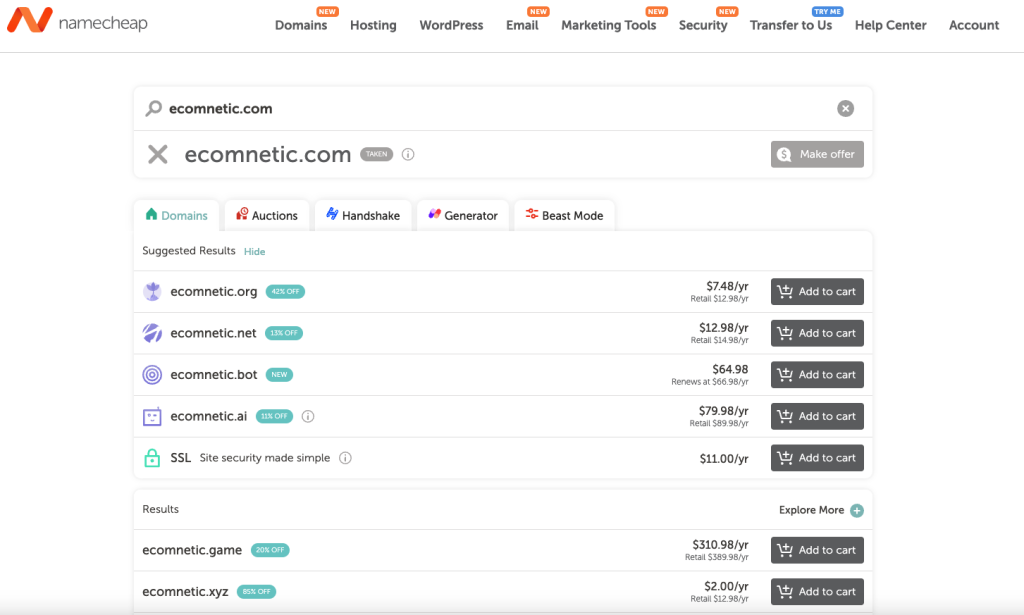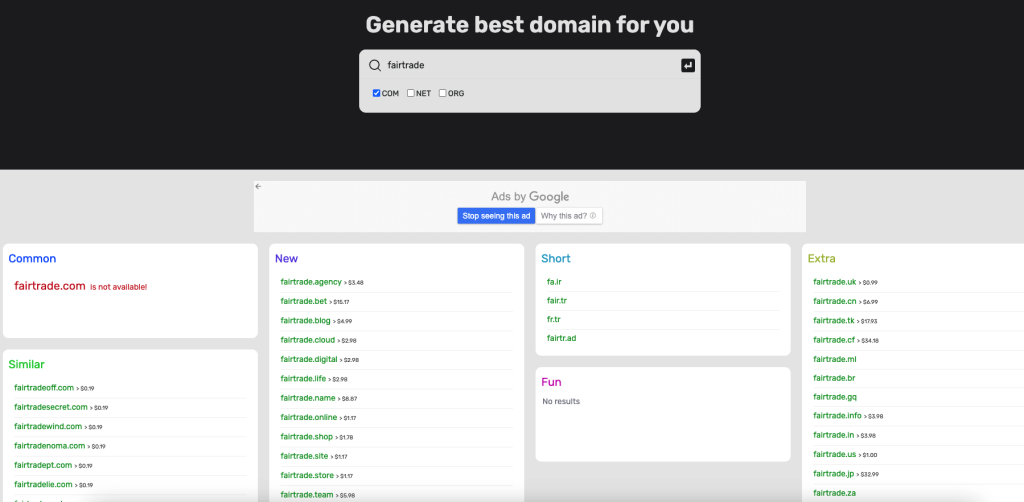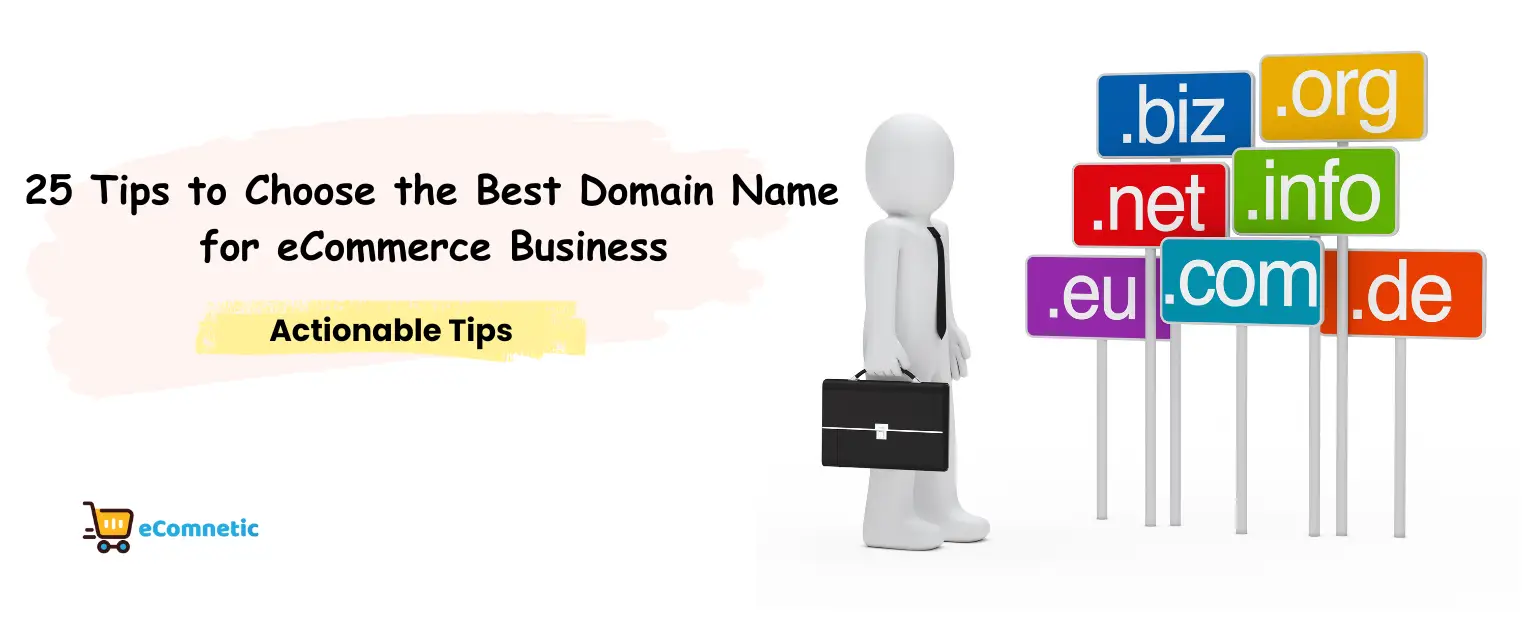Choosing the perfect domain name is one of the most crucial decisions you’ll make when launching your eCommerce business. It’s not just a web address; it’s the foundation of your brand’s online identity.
A well-chosen domain name can propel your business forward, making it easier for customers to find you, trust you, and remember you. But with millions of domain names already registered, how do you find one that’s unique, memorable, and aligned with your business goals?
In this guide, we’ll walk you through 25 actionable tips to help you choose the best domain name for your eCommerce venture. Whether you’re starting fresh or rebranding, these insights will ensure your domain name sets you up for success.
Let’s get started.
1. Understand What a Domain Name Is and Its Importance
Before diving into tips, it’s essential to grasp what a domain name is and why it’s crucial for your eCommerce business.
A domain name is your website’s address on the internet, such as “example.com.”
It’s often the first thing people see when they encounter your brand online. A good domain name enhances your brand’s credibility, SEO rankings, and memorability.
2. Make Your Domain Name Unique & Brandable
Your domain name should be distinctive and reflect your brand’s personality. A unique and brandable domain is more likely to stand out in a crowded marketplace.
Consider how brands like “Shopify” or “Amazon” have names that are easy to remember and associate with their services.
Example: If you’re selling eco-friendly products, a name like “EcoCommerceHub.com” could emphasize your niche while being brandable.
3. Keep the Name Short & Easy to Memorize
A short, concise domain name is easier for customers to remember and type.
Ideally, aim for 15 characters or less. Short names are also less prone to typos, which can lead to lost traffic.
Example: Instead of “BestOrganicProductsForYou.com,” consider something like “OrganicHub.com.”
4. Use Relevant Keywords (But Only If They Make Sense)
Incorporating relevant keywords can help with SEO, but it’s important to balance this with brandability. Keywords should fit naturally within your domain and not make it sound generic.
Example: If you sell handmade jewelry, “ArtisanJewels.com” uses a keyword while still being brandable.
5. Choose a Domain Extension That Aligns With Your Industry
While .com remains the most popular and trusted domain extension, there are other options like .store, .shop, or .tech that might be more relevant to your niche. These can make your domain more specific to your business.
Example: For a tech-focused store, “InnovateTech.shop” might be more fitting than a .com.
6. Avoid Hyphens, Numbers, and Special Characters
Hyphens and numbers can make your domain more complicated to type and remember. They also increase the risk of typos, which can lead to lost visitors. Keep it simple and straightforward.
Example: “Top-10-Best-Products.com” is harder to remember than “TopProducts.com.”
7. Check for Trademarks and Legal Issues
Before finalizing your domain name, ensure it’s not infringing on any existing trademarks. This will save you from potential legal troubles and protect your brand’s integrity.
Example: If you plan to name your store “AppleTechGadgets.com,” be wary of legal issues with the “Apple” trademark.
8. Perform a Domain Name Availability Check

Always check if your desired domain name is available. Use domain registrars like GoDaddy or Namecheap to verify availability. If it’s taken, consider reaching out to the owner for purchase or brainstorm alternatives.
9. Pass the Radio Test
The radio test ensures that your domain name is easy to understand and spell when heard aloud.
Imagine telling someone your domain name over the phone or on a podcast—would they easily grasp it without needing clarification?
Example: A name like “KlearKutz.com” might fail the radio test due to the unconventional spelling of “clear.”
10. Consider Future-Proofing Your Domain Name
Think long-term when choosing your domain. Will it still be relevant if your business expands its product range or pivots slightly? Avoid names that are too narrow in focus.
Example: A domain like “LaptopCovers.com” might limit you if you later decide to sell phone covers as well. Instead, something broader like “DeviceCovers.com” could offer more flexibility.
11. Test Your Domain Name with Your Target Audience
Before you commit, test your potential domain names with a small group from your target audience. Gather feedback on ease of understanding, memorability, and overall impression.
Example: If your target audience finds your chosen name confusing or dull, it’s worth revisiting your options.
12. Choose a Domain Name That’s Mobile-Friendly
With the majority of internet traffic coming from mobile devices, your domain should be easy to type on a small screen. Avoid long names that might be cumbersome on mobile.
Example: A domain like “BuyOurBestOrganicSkincareProductsNow.com” would be difficult to type on a mobile device.
13. Consider Multiple Domain Extensions to Protect Your Brand

To protect your brand, consider purchasing multiple domain extensions (e.g., .com, .net, .org) or similar domains to prevent competitors from using them.
Example: If your main domain is “EcoShop.com,” you might also want to secure “EcoShop.net” and “EcoShop.org.”
14. Make Sure Your Domain Name Reflects Your Business Growth Plans
Your domain should accommodate future growth. For instance, if you start with a specific niche but plan to expand, choose a name that won’t box you in.
Example: Instead of “OrganicTeasOnly.com,” which limits you to tea, consider “OrganicBrews.com” if you plan to add coffee later.
15. Act Quickly to Secure Your Domain Name
Domain names can get snatched up quickly, so once you’ve decided on a name, act fast to register it before someone else does.
Example: If you’ve settled on “GreenGrove.com,” don’t wait too long to register it, or you might lose it to another buyer.
16. Consider Alternative Domain Extensions if .com is Unavailable
While .com is preferred, it’s not the only option. Explore other top-level domains (TLDs) like .store, .online, or country-specific domains if the .com version is unavailable.
Example: If “GreenGrove.com” is taken, you might consider “GreenGrove.shop” or “GreenGrove.store.”
17. Position Yourself to Scale
Your domain should allow for easy scaling of your business. Avoid overly specific terms that might hinder expansion into new product lines or markets.
Example: A domain like “KidsBookShop.com” might be limiting if you later decide to sell books for all ages.
18. Use Domain Name Generators for Inspiration

If you’re stuck, use domain name generators like NameMesh or Lean Domain Search to brainstorm ideas. These tools can combine keywords and suggest available options.
Example: Entering “eco” and “shop” might yield suggestions like “EcoShopper.com” or “EcoStorefront.com.”
19. Avoid Trendy Terms or Slang
While trendy terms or slang might seem appealing, they can quickly become outdated. Choose words that have staying power and won’t age poorly.
Example: A domain like “LitClothing.com” might not age well as the term “lit” falls out of fashion.
20. Consider Geographical Relevance
If your business targets a specific location, consider including geographical keywords in your domain. This can also help with local SEO.
Example: “SydneyEcoShop.com” immediately signals location relevance.
21. Avoid Names That Limit Your Brand’s Reach
While it’s important to be specific, don’t choose a name that’s so niche it limits your potential audience.
Example: “VeganShoesForWomen.com” might limit your audience, whereas “EcoFootwear.com” allows for broader appeal.
22. Ensure Your Domain Name is Easy to Pronounce
A domain name that’s easy to pronounce is more likely to be shared by word of mouth. If people struggle to say your domain name, they’re less likely to remember it.
Example: “Zxyly.com” is difficult to pronounce and remember, unlike “BlueLeaf.com.”
23. Keep It Simple and Avoid Complex Words
Simplicity is key. Avoid complex words or phrases that might confuse potential visitors. Simple names are more memorable and easier to spell.
Example: “ArtisanCraftsEmporium.com” might be too complex, while “CraftHub.com” is simpler and easier to remember.
24. Think About the Visual Appeal of Your Domain Name
Consider how your domain name looks in print and online. A visually appealing name can make a stronger impact, especially when it’s seen on social media or advertisements.
Example: A name like “PopCornClub.com” has a nice visual flow and is easy to read.
25. Don’t Overthink It – Choose and Move Forward
While it’s important to choose wisely, don’t let the decision-making process paralyze you. If you’ve found a domain that meets most of the criteria, go ahead and register it.
Instead of agonizing over every minor detail, trust your instincts and secure the name.
Frequently Asked Questions (FAQs) on Choosing a Domain for eCommerce
A domain name is your website’s address on the internet, like “example.com.” It’s what users type in their browsers to visit your site.
A good domain name enhances your brand’s credibility, SEO rankings, and memorability, making it easier for customers to find and trust you.
While .com is the most popular and trusted, it’s not mandatory. Consider other extensions like .store or .shop if they better suit your business.
Aim for a domain name that’s 15 characters or less. Shorter names are easier to remember and type.
Yes, but only if they make sense and fit naturally. Keywords can help with SEO but shouldn’t compromise brandability.
It’s best to avoid hyphens and numbers. They can be confusing, hard to remember, and prone to typos.
Use domain registrars like GoDaddy or Namecheap to search for your desired domain and see if it’s available.
Consider alternative domain extensions, slightly alter the name, or contact the owner to see if it’s for sale.
Ensure it’s unique, easy to remember, and reflects your brand’s personality. Avoid generic terms.
Yes, purchasing multiple extensions like .net or .org can protect your brand and prevent competitors from using them.
The radio test checks if your domain is easy to understand and spell when heard aloud. If someone hears it on the radio, they should be able to easily find it online.
Yes, but it involves technical steps and can impact your SEO and branding. It’s best to choose wisely from the start.
A trademark search ensures your domain name doesn’t infringe on existing trademarks, protecting you from legal issues.
Keep it short and simple so it’s easy to type on mobile devices. Avoid long or complex names.
Yes, if you’re stuck. Generators can help brainstorm ideas by combining keywords and suggesting available domains.
It can be, especially if the name is perfect for your brand. However, it may cost more than registering a new one.
Yes, you can point multiple domain names to the same website. This is often done to capture more traffic or protect a brand.
.com is usually the best for international reach, but country-specific domains (e.g., .co.uk, .de) can be useful for targeting specific regions.
Registering a domain is quick, usually taking just a few minutes through a domain registrar.
New domain registrations typically cost between $10 and $50 per year, but premium or existing domains can cost much more.
Try slight variations of your domain name for social media handles, but aim to keep them as consistent as possible to maintain brand coherence.
A well-chosen domain name with relevant keywords can improve SEO by making your site more relevant to search queries. However, content quality and backlinks are more critical factors.
If your business primarily serves a local market, including the location can help with local SEO. For example, “MiamiBakery.com” targets customers in Miami specifically.
If you don’t renew your domain, it will eventually become available for others to purchase. This could result in the loss of your website and email services.
Yes, many businesses use their domain name as their business name, especially in eCommerce, to strengthen brand identity and make it easier for customers to remember.
Test it by asking a few people to spell it out after hearing it. If they get it right without needing clarification, your domain name is easy to spell.
Yes, once you own a domain, you can create professional email addresses like “[email protected],” which adds credibility to your business.
Domain forwarding allows you to redirect one domain to another. For instance, if you own multiple domains, you can forward them to your main site to capture more traffic.
Including product names can be beneficial if you’re focused on a specific niche. However, it might limit your brand’s growth if you expand your product line later.
Consider purchasing the domain if it’s critical to your brand. If not, focus on building a strong brand identity and SEO so your site remains the primary result in search engines.
Final Thoughts
Your domain name is more than just a URL— it’s the first impression your brand makes online. By carefully considering the tips outlined in this guide, you’ll be well-equipped to choose a domain name that not only reflects your brand but also drives traffic and fosters growth.
Remember, the right domain name can become a powerful asset for your eCommerce business, making it easier for customers to find you and engage with your brand.
As you go ahead on this journey, stay true to your brand’s vision, think long-term, and most importantly, don’t hesitate to take action. The perfect domain name is out there waiting for you — go claim it!

